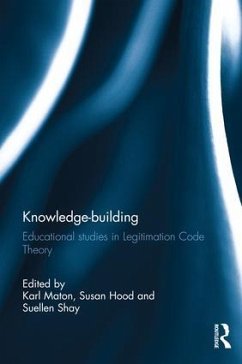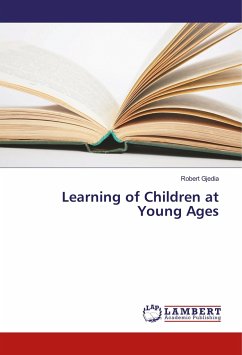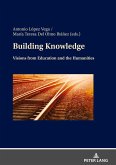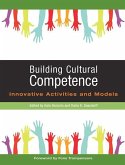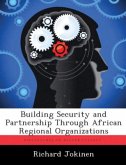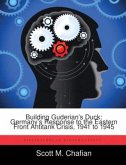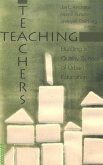Education and knowledge have never been more important to society, yet research is segmented by approach, methodology or topic. Legitimation Code Theory or 'LCT' extends and integrates insights from Pierre Bourdieu and Basil Bernstein to offer a framework for research and practice that overcomes segmentalism. This book shows how LCT can be used to build knowledge about education and society. Comprising original papers by an international and multidisciplinary group of scholars, Knowledge-building offers the first primer in this fast-growing approach.
Through case studies of major research projects, Part I provides practical insights into how LCT can be used to build knowledge by:
- enabling dialogue between theory and data in qualitative research
- bringing together quantitative and qualitative methodologies in mixed-methods research
- relating theory and practice in praxis
- conducting interdisciplinary studies with systemic functional linguistics
Part II offers a series of studies of pressing issues facing knowledge-building in education and beyond, encompassing:
- diverse subject areas, including physics, English, cultural studies, music, and design
- educational sites: schooling, vocational education, and higher education
- practices of research, curriculum, pedagogy and assessment
- both education and informal learning contexts, such as museums and masonic lodges
Carefully sequenced and interrelated, these chapters form a coherent collection that gives a unique insight into one of the most thought-provoking and innovative ways of building knowledge about knowledge-building in education and society to have emerged this century. This book is essential reading for all serious students and scholars of education, sociology and linguistics.
Through case studies of major research projects, Part I provides practical insights into how LCT can be used to build knowledge by:
- enabling dialogue between theory and data in qualitative research
- bringing together quantitative and qualitative methodologies in mixed-methods research
- relating theory and practice in praxis
- conducting interdisciplinary studies with systemic functional linguistics
Part II offers a series of studies of pressing issues facing knowledge-building in education and beyond, encompassing:
- diverse subject areas, including physics, English, cultural studies, music, and design
- educational sites: schooling, vocational education, and higher education
- practices of research, curriculum, pedagogy and assessment
- both education and informal learning contexts, such as museums and masonic lodges
Carefully sequenced and interrelated, these chapters form a coherent collection that gives a unique insight into one of the most thought-provoking and innovative ways of building knowledge about knowledge-building in education and society to have emerged this century. This book is essential reading for all serious students and scholars of education, sociology and linguistics.
"...a generous, challenging and generative contribution to research into education and society that provides invaluable insights, ideas and tools for enactment... the book offers useful tools for change to both researchers and educational practitioners alike ... Even if readers of this volume are new to LCT research and theory, they will be able to make sense of the theory and how it has been enacted in the studies"
- Sherran Clarence, Rhodes University, South Africa
"The book offers insight into an astonishing way of analyzing and building knowledge about knowledge and its practices in different contexts ... one of the most promising theoretical framework for analyzing knowledge practices ... a great example of using the theory in research. ... It is also a great introduction to research design using LCT, which overcomes the dichotomy between theory and practice."
- Marcin Boryczo, University of Gdansk, Poland
"[T]he book's scope and contents make it a valuable resource for English teachers and researchers. It is an excellent primer... for either action research or academic research projects. The value of Knowledge-Building is that is demonstrates many of the research tools that are needed to discover the answers ... [to] questions which need to be addressed if we are to better enable English language learners to be academically successful and to integrate more successfully into English speaking cultures"
- Richard Ingold, Navitas English, Sydney, Australia
"This volume proves to be an inspiration for readers of different fields. First, it helps to bridge the gaps haunting humanities and social sciences. Second, it is a good example of how interdisciplinary research can be done by enacting complimentary theories for explanatory purposes, which is, in this case, the combination of SFL and LCT. Thirdly, it offers educational theorist advice concerning policy making and curriculum design. Fourthly, it provides teachers with implications on how to promote knowledge building in their teaching practice."
- Yan Liu and Hui Yu, Functional Linguistics
"This volume succeeds in its aims to provide an accessible introduction to the explanatory framework of LCT for learners with no previous knowledge. It will certainly become an indispensable craft of LCT to understand the centrality to cumulative knowledge... The accessible and iterative explanatory framework presented in this volume would help Lower-division undergraduates, graduate students, ELT practitioners, ESP learners and researchers who are working in sociology, linguistics, education, science, philosophy, and interdiscipline to develop knowledge building in their study practices."
- Zhong Jiabao, Discourse-Studies in the Cultural Politics of Education
- Sherran Clarence, Rhodes University, South Africa
"The book offers insight into an astonishing way of analyzing and building knowledge about knowledge and its practices in different contexts ... one of the most promising theoretical framework for analyzing knowledge practices ... a great example of using the theory in research. ... It is also a great introduction to research design using LCT, which overcomes the dichotomy between theory and practice."
- Marcin Boryczo, University of Gdansk, Poland
"[T]he book's scope and contents make it a valuable resource for English teachers and researchers. It is an excellent primer... for either action research or academic research projects. The value of Knowledge-Building is that is demonstrates many of the research tools that are needed to discover the answers ... [to] questions which need to be addressed if we are to better enable English language learners to be academically successful and to integrate more successfully into English speaking cultures"
- Richard Ingold, Navitas English, Sydney, Australia
"This volume proves to be an inspiration for readers of different fields. First, it helps to bridge the gaps haunting humanities and social sciences. Second, it is a good example of how interdisciplinary research can be done by enacting complimentary theories for explanatory purposes, which is, in this case, the combination of SFL and LCT. Thirdly, it offers educational theorist advice concerning policy making and curriculum design. Fourthly, it provides teachers with implications on how to promote knowledge building in their teaching practice."
- Yan Liu and Hui Yu, Functional Linguistics
"This volume succeeds in its aims to provide an accessible introduction to the explanatory framework of LCT for learners with no previous knowledge. It will certainly become an indispensable craft of LCT to understand the centrality to cumulative knowledge... The accessible and iterative explanatory framework presented in this volume would help Lower-division undergraduates, graduate students, ELT practitioners, ESP learners and researchers who are working in sociology, linguistics, education, science, philosophy, and interdiscipline to develop knowledge building in their study practices."
- Zhong Jiabao, Discourse-Studies in the Cultural Politics of Education

